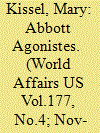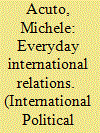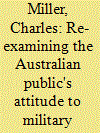|
|
|
Sort Order |
|
|
|
Items / Page
|
|
|
|
|
|
|
| Srl | Item |
| 1 |
ID:
134840


|
|
|
|
|
| Summary/Abstract |
You know things aren’t going well for conservative Australian Prime Minister Tony Abbott when the Institute of Public Affairs (IPA) in Melbourne, the country’s most prominent free-market think tank and formerly Abbott’s biggest cheerleader, takes out a full-page advertisement in the Australian newspaper to criticize him. Published on August 8th, the ad quotes Abbott from a speech he gave at the think tank two years earlier: “Freedom of speech is an essential foundation of democracy.” Then it continues: “We agree, Prime Minister. That’s why we will fight to repeal section 18C of the Racial Discrimination Act. Even if you won’t.”
|
|
|
|
|
|
|
|
|
|
|
|
|
|
|
|
| 2 |
ID:
136700


|
|
|
|
|
| Summary/Abstract |
Australia should not embrace America, writes its former prime minister, but preserve itself from Washington’s reckless overreach.
|
|
|
|
|
|
|
|
|
|
|
|
|
|
|
|
| 3 |
ID:
136810


|
|
|
|
|
| Summary/Abstract |
India and Australia have overall traditionally shared cordial relations despite hitting rough weather during certain phases. With India’s efforts to look further east beyond her immediate south-eastern neighbors, and Australia’s desire to look further west beyond Japan and South Korea, have of late brought greater convergence in their interests.
|
|
|
|
|
|
|
|
|
|
|
|
|
|
|
|
| 4 |
ID:
134961


|
|
|
|
|
| Summary/Abstract |
This special issue of the Asia Europe Journal focuses on a triangulated conversation between scholars working in/on Asia, Europe and Australia. The essays showcase the work of early career researchers involved in the EU-Oceania Social Science Inter-regional Consortium (EUOSSIC) Erasmus Mundus exchange programme that links leading universities in Europe1 with those in Australia2 and New Zealand3 to promote the study of European Union (EU) external relationships. Erasmus Mundus was launched in 2004 and is funded by the Education and Culture Directorate General of the European Commission with the objectives of enhancing the quality of European higher education and the promotion of dialogue and understanding between people and cultures through cooperation with third countries. The aim of the EUOSSIC Erasmus Mundus exchange programme (2011–2013) is to build on existing connections to create a formal programme of inter-regional exchanges between the EU and Oceania for doctoral and post-doctoral scholars as well as academic staff with a Social Science background. In total, 61 doctoral students, 11 post-doctoral fellows and 27 academic staff were involved in the EUOSSIC Erasmus Mundus programme.
|
|
|
|
|
|
|
|
|
|
|
|
|
|
|
|
| 5 |
ID:
134248


|
|
|
|
|
| Summary/Abstract |
Since the Vietnam War, Australian defence policy has been based on the concept of self-reliance—the ability to defend Australia without allied combat forces. Self-reliance arose from concerns about US support in conflict with Indonesia. It has implications for Australian foreign policy, force structuring, joint operations and the defence industry, which were most coherently laid out in the 1987 White Paper. Later White Papers adapted this framework, but the 2013 White Paper seems to move towards a new approach to defence policy and strategy, which continued use of the term ‘self-reliance’ obscures rather than elucidates.
|
|
|
|
|
|
|
|
|
|
|
|
|
|
|
|
| 6 |
ID:
134995


|
|
|
|
|
| Summary/Abstract |
Australia’s foreign and security policy debate has become focused on how to manage the fundamental change in strategic and economic circumstances brought about by China’s rise. For the first time in the
nation’s history, Australia’s chief trading partner is neither an ally, nor the ally of an ally, and does not share its democratic outlook and values. This change comes against the backdrop of an increasingly
contested Indo-Pacific Asia. This article addresses two questions. First, how does Australia perceive a rising and increasingly powerful China? Second, how is Australia responding? It is argued that Australia possesses a discernable China strategy, although questions remain about its implementation, effectiveness and sustainability. That strategy has two broad strands—engagement and hedging—and the hedging strand contains several important sub-strands, namely, internal balancing (modernizing Australia’s own military) and external balancing (especially strengthening the US alliance). Each of these hedging approaches carries its own problems and questions, particularly regarding Australia’s willingness to fund an advanced military and whether the net effect of a strengthened US alliance can be stabilizing.
|
|
|
|
|
|
|
|
|
|
|
|
|
|
|
|
| 7 |
ID:
136947


|
|
|
|
|
| Summary/Abstract |
To a great extent, popular representations of Indo–Australian relations have been viewed through the lens of CRICKET – the national game in both countries. Despite a proliferation of writing on colonial Indian CRICKET, Australia’s contribution to it has been largely ignored. In October 1935, a team of cricketers embarked on the first Australian tour to the subcontinent.1 The tour was conceived and FINANCED by the Maharaja of Patiala to assist preparation of an official Indian team to tour Britain in 1936. In this paper, I will draw upon primary sources and interviews to help articulate the complex colonial relationship between the East and the West, whilst locating the ambiguous position of Australia within this. Despite predominantly conforming to the Orientalist view that Westerners considered themselves a superior ‘race’, the Australian cricketers demonstrated an atypical cultural sensitivity to the Orient and the ‘Other’.
|
|
|
|
|
|
|
|
|
|
|
|
|
|
|
|
| 8 |
ID:
135401


|
|
|
|
|
| Summary/Abstract |
Amid the buzz around new US and EU sanctions being imposed on Russia, sanctions on another country, on the other side of the world, were being gently lifted. In October, following elections, America and Australia removed all remaining sanctions on Fiji, which had included travel bans for top officials, an embargo on arms sales and limits on financial assistance.
The sanctions can be at least partly credited for holding President Frank Bainimarama, the retired rear admiral who seized power in a bloodless 2006 coup, to his promise of holding elections in 2014, albeit having failed to persuade him to move the timetable forward.
|
|
|
|
|
|
|
|
|
|
|
|
|
|
|
|
| 9 |
ID:
135577


|
|
|
|
|
| Summary/Abstract |
The article focuses on the defense sector and armed forces of Australia, and states that it has a defense budget of around 30 billion U.S. dollars for 2014-15. Topics include establishment of the Independent Project Performance Office (IPPO) by the former Defense Minister Stephen Smith in 2011, Defence Minister David Johnston's proposal for the restructuring of country's military procurement agency Defence Material Organisation in 2014, and the future of Australia's military preparedness. INSET: LAND FORCES 2014.
|
|
|
|
|
|
|
|
|
|
|
|
|
|
|
|
| 10 |
ID:
136313


|
|
|
|
|
| Summary/Abstract |
The government’s energy efficiency opportunities (EEO) programme, as per the energy efficiency opportunities act – 2006 and the associated regulations, aims to enable industry to become more energy efficient. Participations in the programme is mandatory for corporations with whose energy use exceeds 0.5 petajoules (PJ) (the equivalent of 10000 household) in a financial year.
|
|
|
|
|
|
|
|
|
|
|
|
|
|
|
|
| 11 |
ID:
136096


|
|
|
|
|
| Summary/Abstract |
Garbage is stuff that matters: the generation, disposal, and management of waste represent some of the most visceral flows in our society. Yet most international scholars continue to regard it as trivial to focus on the mundane practices and menial materiality associated with managing rubbish. Contra this dissociation, and through an analytics of assemblages, I argue that international theory can (and nowadays must) encompass both the grand designs of diplomacy and the mundane cosmopolitics of everyday life. In the everyday, the “international” is embodied, performed, and domesticated. I chart these multi-scalar connections as they unfold in Sydney, Australia, demonstrating how a focus on a global challenge such as climate change has been redefining the mundane realities of waste management.
|
|
|
|
|
|
|
|
|
|
|
|
|
|
|
|
| 12 |
ID:
134947


|
|
|
|
|
| Summary/Abstract |
The decision of the International Court of Justice in the Australia/Japan Whaling Case marks an advance in the law of the sea and the obligation on states to cooperate in common ocean resource regimes. The Court found substantially for Australia, prohibiting Japan's long-running program to capture large cetaceans in the Southern Ocean around Antarctica for scientific research. The Court's discussion of the criteria for states to design and implement scientific research whaling programs is assessed, as is the obligation for cooperation in such research and ocean research generally. The result for whaling and for the future work of the International Whaling Commission is considered.
|
|
|
|
|
|
|
|
|
|
|
|
|
|
|
|
| 13 |
ID:
134948


|
|
|
|
|
| Summary/Abstract |
The case Whaling in the Antarctic (Australia v. Japan) decided by the International Court of Justice is a landmark that introduces new parameters for measuring the “reasonableness” of scientific research by permit under the International Convention on Whaling. However, aspects of these parameters and how they may be applied in future cases remain uncertain. Because the Court's interpretation of the language “for purposes of scientific research” avoids defining scientific research, the Court's decision provides only a limited degree of clarification for States that intend to operate scientific whaling programs under Article VIII of the Convention. The Court's reasonableness test is unlikely to prevent scientific whaling. States who no longer support the dual object and purpose of the Whaling Convention may want to consider negotiating a new international instrument that would be more protective of whales and their habitat.
|
|
|
|
|
|
|
|
|
|
|
|
|
|
|
|
| 14 |
ID:
136007


|
|
|
|
|
| Summary/Abstract |
Once listed as a project of concern the project SEA 1448 phase-2 ANZAC anti-ship missile defence programme has been turned round to become a flagship defence acquisition programme for Australia. Richard Scott reports.
|
|
|
|
|
|
|
|
|
|
|
|
|
|
|
|
| 15 |
ID:
134657


|
|
|
|
|
| Summary/Abstract |
Australia's interest in nuclear weapons in the 1950s and 60s is usually explained in terms of high politics and grand strategy. This proliferation case study explores, in greater detail than hitherto, the important part played by the Royal Australian Air Force (RAAF) in pressing for a nuclear capability. It seeks to understand the reasons behind the RAAF's lobbying, in particular its previous experience with air power, its visceral desire for advanced manned bomber aircraft, and its strong institutional link to the British Royal Air Force. The decision in 1963 to acquire the supersonic US F-111 strike aircraft, instead of rivals including the British TSR.2, is also considered. Once the RAAF's bomber ambitions were satisfied, interest in nuclear weapons was greatly reduced. Finally, some comments are included on the nuclear interests of other air forces in the British Commonwealth.
|
|
|
|
|
|
|
|
|
|
|
|
|
|
|
|
| 16 |
ID:
134247


|
|
|
|
|
| Summary/Abstract |
Australia, like most other developed democracies, is often alleged to suffer from ‘casualty phobia’. The perception that the Australian public will not tolerate casualties in foreign conflicts has shaped the decisions of both civilian and military policy makers. Measures taken to protect Australian forces from casualties may, for instance, also serve to increase the risk to civilians in the country to which they are deployed. The USA underwent a similar debate some years ago. Innovative public opinion research techniques—especially ‘survey experiments’ which allow researchers to establish causal relationships by consciously manipulating one variable while holding others constant—have established that the American public are not reflexively casualty-phobic and that the impact of casualties on public opinion can be outweighed by other factors, such as the public's confidence in the mission's overall success. In this article, the author replicates one of the key survey experiments from the US debate, suitably adapted to Australian conditions, with a nationally representative sample of Australian voters. The author finds that the same pattern holds in Australia as in the USA: casualties do lower public support for a given mission, but the mission's chances of success matter more.
|
|
|
|
|
|
|
|
|
|
|
|
|
|
|
|
| 17 |
ID:
135563


|
|
|
|
|
| Summary/Abstract |
We ask if self-reliance is an outdated and unaffordable policy principles for the Australian Defence Force – ADF. the affordability, relevance and utility on self-reliance in the so-called ‘Asian Century’ are questionable, and by critically examining the 2013 defence white paper, capacity for the ADF to act independently is – and has always been a fantasy, dislocated from ADF capability development and forces structure prioritisatoin
|
|
|
|
|
|
|
|
|
|
|
|
|
|
|
|
| 18 |
ID:
136319


|
|
|
|
|
| Summary/Abstract |
Australia with its detailed and well-spaced out roadmap, aims to reach its hydrogen economy status by 2040-2050. In this five decades long journey that began in the year 2000, the country is now focusing on its R&D efforts, spread over a range of basic and applied research area.
|
|
|
|
|
|
|
|
|
|
|
|
|
|
|
|
|
|
|
|
|